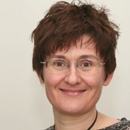Advisory Board and Editors Pharmacology

Maria A. Deli
Scientific advisor at the Institute of Biophysics, Biological Research Centre of the Hungarian Academy of Sciences in Szeged, Hungary. Head of the Biological Barriers Research Group. Honorary professor at the University of Szeged.

Marwa A. A. Fayed
Dr. Marwa Fayed is an Associate Professor of Pharmacognosy and Phytochemistry within the Faculty of Pharmacy, University of Sadat City, Egypt.
Interested in Phytochemical and Pharmacognostical studies of medicinal plants, isolation of bioactive constituents from different natural sources using advanced chromatographic techniques (separation on VLC, column chromatography using different adsorbents such as RP, Sephadex, Cellulose or Polyamide and separation using PC), structure elucidation of naturally isolated compounds using different spectroscopic techniques (1D, 2D).
More recently, she has developed a significant interest in monitoring the pharmacological effects and mechanism of action of different classes of chemical compounds isolated from natural sources and their possible role in medicine.

Chris J Garland
Professor of Vascular Pharmacology, University of Oxford and Fellow and Tutor in Medicine, Magdalen College, Oxford. Visiting Professor at the University of Queensland, Australia. Previously, Head and Professor of Pharmacology, University of Bath and Professor of Cardiovascular Pharmacology, University of Bristol. Visiting Professorships; University of Nagoya, Japan, Monash University, Australia and the National Academy of Sciences, Taiwan.

Shawn M Gomez
Professor and Associate Chair for Research in the Joint Department of Biomedical Engineering at UNC-CH and NCSU and Professor in the Department of Pharmacology at UNC-CH. Previous Florence Gould Scholar and Pasteur Foundation Fellow. Current research interests in systems and synthetic biology, bioimage informatics, and network science applied to biology. Broader interests in translational medicine and the fostering of innovative solutions to problems in healthcare.

Elena González-Burgos
Assistant professor of Pharmacology and Pharmacognosy at University Complutense of Madrid. Member of the Research Group “Pharmacology of Natural Products”. I obtained my European PhD in Pharmacy in 2012 (Extraordinary Doctoral Prize). I had worked for 3 years in the Spanish Agency of Medicines and Medical Devices (AEMPS). Expertise in the study of natural products from medicinal plants and lichens as neuroprotective agents, based on their antioxidant properties, against different models of oxidative stress in cell lines of the nervous system (neurons and astrocytes). Author of many scientific publications (25 in indexed journals, 4 in non-indexed journals and 9 chapters of books) as well as communications in national and international congresses. I have participated as researcher in four National funded projects and research stays at prestigious international centers (King’s College of London and Neuroscience Center in Coimbra). Teaching experience at all levels of higher education in Pharmacology, Toxicology and Pharmacognosy subjects as well as experience in Educational Innovative Projects.

Fanglin Guan
Prof. Fanglin Guan is Dean at Xi'an Jiaotong University. He is engaged in the integrated biological research of complex diseases, including tumor microenvironment and novel immunotherapeutic modalities, and research on the mechanisms and medical applications related to tumor cell vaccines, especially for the exploration of the mechanism of determining the biomarkers of complex diseases.

Thomas Hartung
Professor of Toxicology (Chair for Evidence-based Toxicology), Pharmacology, Molecular Microbiology and Immunology at Johns Hopkins Bloomberg School of Public Health, Baltimore, and University of Konstanz, Germany; Director of their Centers for Alternatives to Animal Testing (CAAT). Former Head of the European Center for the Validation of Alternative Methods (ECVAM), Ispra, Italy.

Hidekazu Hiroaki
Dr. Hidekazu Hiroaki is Professor within the Graduate School of Pharmaceutical Sciences, Nagoya University, Japan. He received his PhD in Pharmaceutical Sciences (PhD thesis "Spectroscopic study for interaction between DNA oligonucleotide and bleomycin”) from the Graduate School of Osaka University, Japan in 1992.
Dr Hiroaki's research focuses on the structural biology of proteins by using solution NMR techniques, including protein-protein and protein-drug interaction. He is also focusing on NMR-assisted in silico drug discovery as well as protein structure determination. He is also an expert of intrinsically disordered proteins and some disease related amyloid genic proteins.
Professional experience:
2012-present: Professor, Graduate School of Pharmaceutical Sciences, Nagoya University (Nagoya, Aichi, Japan)
2011-2012: Professor, Research Center for Structural Biology, Department of Science, Nagoya University (Nagoya, Aichi, Japan)
2007-2011: Professor, Division of Structural Biology, Graduate School of Medicine, Kobe University, (Kobe, Hyogo, Japan)
2001-2007: Associate Professor, International Graduate School of Art and Science, Yokohama City University, (Kanagawa, Japan)
1995-2001: Research Scientist, Division of Structural Biology, Biomolecular Engineering Research Institute (BERI) (Suita, Osaka, Japan)
1994-1995: Visiting Scientist, Research Centre, F Hoffman La Roche (Basel, Switzerland)
1992-1994: Research Scientist, Department of Molecular Genetics, Nippon Roche Research Center (Kanagawa, Japan)

Noriko F Hiroi
Noriko Hiroi is Assistant Professor of the Department of Biosciences and Informatics, Keio University. She started to develop her career in Molecular Biology and Biochemistry, and currently works in Systems Biology and Quantitative Biology area. Her research interest includes in vivo oriented modelling, molecular mechanisms of higher-functions of central nerve systems, microfluidics technology and optical technologies and informatics for bioimaging.

Zunnan Huang
Professor in Chemistry; Director, Key Laboratory of Big Data Mining and Precision Drug Design; Director, Key Laboratory of Computer-Aided Drug Design of Dongguan City; Vice Dean, Graduate School of Guangdong Medical University; PhD in Computational Chemistry and Physical Chemistry obtained from the University of Oklahoma; Guest Editor, Current Pharmaceutical Design, Current Medicinal Chemistry, Frontiers in Chemistry, Molecules; Reviewer for more than 50 SCI journals including Journal of the American Chemical Society, Science Advances, Nature Communications and Briefings in Bioinformatics. Authors of more than 117 SCI papers with an accumulated IF of 600.

Marcello Iriti
Dr. Marcello Iriti is an Associate Professor of Plant Biology and Pathology within the Department of Agricultural and Environmental Sciences at the University of Milan.
He has been studying nutraceuticals, functional foods, phytotherapeutics and essential oils relevant for human and animal health, focusing on their preclinical (in vitro/in vivo) and in human pharmacological activities. He has also been investigating the health-promoting effects of traditional Mediterranean diet as well as the ethnopharmacology of herbal remedies of traditional healing systems.
Dr. Iriti is a Member of the World Academy of Sciences, Asian Council of Science Editors and Society of African Journal Editors. Founding Member of the Italian Society of Environmental Medicine. Member of the Working Group ‘Pharmacognosy, Phytotherapy and Nutraceuticals’ of the Italian Pharmacological Society.

Alex Kentsis
Assistant Professor of Pediatrics at the Memorial Sloan Kettering Cancer Center and Weill Cornell Medical College of Cornell University.
He leads research in the functional proteomics and genomic plasticity of refractory childhood cancers.

